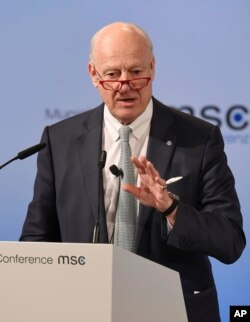The U.N.'s special envoy for Syria met Thursday with a Syrian government delegation and envoys for the opposition in Geneva, as he launched the latest effort to find an end to the country's nearly six-year civil war.
Staffan de Mistura told diplomats from regional and world powers, including the U.S. and Russia, "we are launching a window of opportunity" to determine if a political "road forward" can be found.
"The Syrian people all want an end to this conflict and you all know it," he added. "They are waiting for relief of their own suffering, and the dream of a new road out of this nightmare to a real and normal future in dignity."
De Mistura's comments come a day after he said he does not see any imminent breakthrough on the horizon, but that there was a "political momentum" to move forward on a peace plan.
Syria’s warring parties last met in Geneva nearly nine months ago. That round of talks broke down because of repeated violations of a cease-fire agreement.
De Mistura acknowledged that the successful resumption of the failed negotiations hinged largely on the warring parties abiding by the current cease-fire.
He said Russia, which had worked out the agreement with Turkey in Astana, the capital of Kazakhstan, was using its influence to see that the fragile cease-fire held.
“Today, the Russian Federation after the cease-fire task force did announce to everyone and every country present and to myself that they have formally requested the government of Syria to silence their own skies in the areas attached by the cease-fire during the intra-Syrian talks," he said Wednesday.
De Mistura added that he has asked other countries with influence on the opposition parties to have them stick to the cease-fire and not provoke the other side.
“They do not have airplanes but they can do something similar in terms of reducing any type of provocation on any side to give a better chance to the intra-Syrian talks not to be affected by breakdowns.”
The U.N. envoy warned that there were, what he called “spoilers,” who would try to provoke one side or the other to walk out of the talks or to refuse to talk.
“We will try to control it,” he said. “It is time to talk and fight on the table, through the table, but not in the field.”
Since beginning in March 2011, Syria’s civil war has killed around 400,000 people, displaced more than six million inside Syria, half of them children and prompted nearly five million to flee as refugees into neighboring countries. An estimated 13.5 million people need humanitarian assistance.
De Mistura said the more inclusive the talks, the better the chance of success. The envoy noted that he was unable to get the assent of the parties to include women, who make up 52 percent of the Syrian population, in the talks.
Therefore, he said, he has established a Syrian Women’s Advisory Board to participate in the talks in a consultative capacity.
“The first meeting of today was with a group of seven women - Syrian women,” he said. “All of them united by one fact - they’re being either detainees or tortured or abducted. Or they have their mothers, daughters or wives of detainees or abducted people."
“Detainees are those by the government - thousands - and abducted are those by the opposition,” he said. “We should never forget the suffering of so many Syrians on one side and the other too during this conflict.”
De Mistura said he was not sure what role the United States would play in the negotiations, but understood that the new Trump administration needed time to devise a new strategy.
”They have announced that they want to revisit their strategy regarding the fight against Daesh, IS, and that by implication what they are doing in Iraq and in Syria…So, I would say let us wait for that,” said de Mistura, using acronyms for Islamic State.
He noted, however, that the U.S. official who had attended previous intra-Syrian talks also would be present at this round. “So, I am convinced that they will be very supportive with whatever we try to do.”
The U.N. envoy said he would begin with a series of bilateral talks to discuss how to proceed with the negotiations.
In previous rounds, the parties held indirect talks, with de Mistura shuttling from one delegation to the other. It is not clear if this system will continue or if the delegations will agree to meet face-to-face.
De Mistura said the agenda will focus on three items: the establishment of a credible, inclusive and non-sectarian governance, the drafting of a new constitution, and free and fair elections under U.N. supervision.
The envoy said he will not agree to any preconditions and fully expected the talks to be serious and substantive.
“Am I expecting a breakthrough? No, I’m not expecting a breakthrough. But, I am expecting and determined for keeping a very proactive momentum,” he said.
“We have to…outpace those few but clear spoilers with the momentum on the political track, and I think we can aim at that.”





